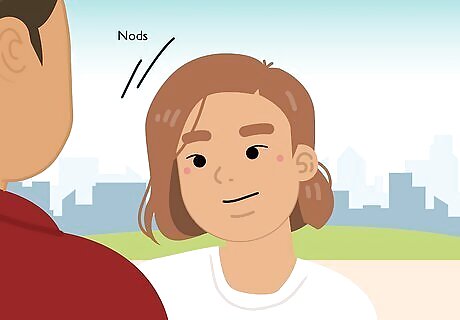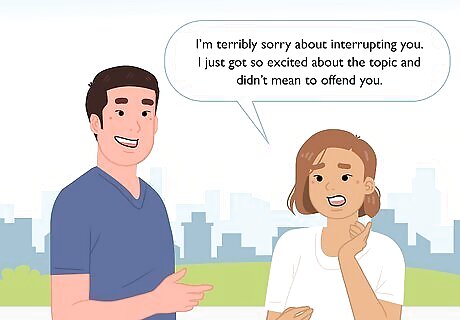
views
X
Research source
But by recognizing that you have a problem and learning to focus on what others are saying, you can stop finishing other people’s sentences.
Practicing Silence to Stop Interrupting Others

Enlist help. If you know that you have a serious problem finishing other people’s sentences, ask your family and friends for help. Let them know you realize that you do this and ask them to tell you when you’ve interrupted conversations. This may make you more aware of your behavior and help you to slowly stop finishing other people’s sentences. Remember that family and friends are happy to help and don’t mean anything bad by telling you that you finish other people’s sentences. This is a measure to help you stop a bad habit. If it’s a part of your family’s culture to have “high involvement style” conversations, you may want to ask friends or even close coworkers to cue you into when you’re finishing people’s sentences.

Listen silently to a song. Before you go out and interact with people, try listening to one of your favorite songs without making noise. You may find it difficult, but it can help you focus on keeping your mouth shut in conversations. Try this technique with other situations. If a friend or family member is on the phone, simply sit and don’t say anything. Respond in your head if necessary, but try and focus on yourself and not saying anything.

Write what you wanted to say. In many cases, you may finish another person’s sentence because you don’t want to forget something clever you have to say in response. You can either make a mental note to come back to the point when the person is done or write on a piece of paper what you wanted to say so that you don’t forget it. Use this technique in formal settings or even with friends if you are really having trouble not finishing other people’s sentences. You can easily say, “I’m really trying to get better about focusing on what people are saying instead of reacting.”

Respond in your head. If you’re part of a conversation or listening in on something that interests you, give yourself a chance to “respond” in your head. Make sure the person completely finishes speaking before you start your silent reply. It sounds tricky, but figuring out when to start responding is a crucial step. Once you’ve responded in your head, see if the time is appropriate to respond in person. Nod your head or say a simple “Yes” while the person is talking, but nothing more. This not only reinforces your desire to not speak but also shows the person that you are paying attention to what he or she is saying.

Breathe or pause before you speak. During a conversation, take deep breaths and try to wait until you are 110% sure the speaker is finished. Taking deep breaths can help slow down your brain and remind you to come up for air before you speak. A breath is a natural pause that can help ensure that the other person is done speaking. Draw a long breath before you start to respond to another person. If the person is still speaking when you’re done inhaling and exhaling, take another breath. Repeat this procedure until the person is finished. Try gently biting your tongue if breathing doesn’t work or the sound overshadows your conversation.
Focusing on Conversations to Avoid Interrupting

Remind yourself to be silent. After you’ve practiced not interrupting others, it’s time to go out in the real world. Any time you start a conversation with someone, the danger of finishing the person’s sentences is there. Remind yourself to let people speak and think of your breathing or tongue biting to stop yourself from your bad habit. Remember that even if your interruption wasn’t meant negatively, the person may perceive it that way. If you’re worried about how the person thinks of you, remind yourself that staying silent for a second longer can’t hurt and may help you in the long run.

Pay close attention. In order to know when to speak and not speak, make sure to pay close attention to a conversation. Actively listening to another person helps you focus on him or her and can keep you from finishing sentences at inopportune moments. Try putting your hand under your chin as a reminder to listen before speaking. Watch the person’s habits. Does your friend always hold doors for others? This can show you that the person is polite and considerate.

Ask if the person is done. If you would like to say something but are not sure the person is done, consider asking him or her. Find a polite way to formulate the question, which shows the person that you are truly interested in what he or she has to say. Watch the person’s mouth to see if they seem finished with the statement or sentence. Say, “Was there anything else you would like to say about that? You have some great points and I have something that I think can really add to your point of view.”

Apologize for interrupting. If you catch yourself finishing another person’s sentence, make sure you apologize for interrupting the person. If you do this enough, you may get out of the habit of finishing other people’s sentences. This also shows the person you care enough about him or her and what he or she has to say that you can wait. Say, “I’m terribly sorry about interrupting you. I just got so excited about the topic and didn’t mean to offend you.” Explain to people that you come from a culture where rapid exchange and finishing people’s sentences is common. Tell the person you’re trying to get better about it and that you’re sorry for interrupting him or her.
Recognizing You Finish People’s Sentences

Watch other people’s reactions. In any conversation, it’s important to pay attention to the people with whom you are speaking. If you are concerned that your finishing people’s sentences too often or that it is causing problems in your relationships, consider seeing how people react when you finish their sentences. The reactions of other people can let you know if you have a problem as well as if it’s affecting your relationships. Be aware that even if you are simply trying to show excitement or intimacy by finishing someone else’s sentence, that may not be the message you are sending. Instead of sending the message, “I know and understand you very well,” the person may think, “You’re putting words in my mouth.”

Ask yourself why you interrupt people. There are many different reasons why you finish people’s sentences. These are not all necessarily negative, either. Maybe it’s because you get excited about a conversation or it is a part of your culture. Figuring out why you are finishing other people’s sentences can help you more readily admit that you may have a problem. Consider your background. Many cultures, including East European, Mediterranean, African and Arab, have a type of conversation called “high involvement style.” This means that finishing the sentences of others is a way to establish a relationship. If you grew up in one of these cultures, it may explain why you finish people’s sentences. Be aware that women are also more likely to finish people’s sentences than men. As with some world cultures, this is also a way of establishing a bond between people. Consider other factors in your finishing people’s sentences. Are you shy and find it difficult to assert yourself or enter a conversation in another way? Do you find it difficult to focus on the other person? Are you impatient when it takes a person a while to get to the point?

Admit it to yourself. You are probably aware that you frequently finish other people’s sentences. It might happen in familiar situations such as at family gatherings or even in formal setting such as work meetings. Either way, perhaps the biggest hurdle in stopping your habit is admitting to yourself that you finish other people’s sentences. Think about conversations you’ve had with people in the past and how they progressed. Did you take advantage of a pause in conversation, chime in together with the person or just flat out finish the person’s sentence? Figuring out the ways you interrupt can cue you into how bad your problem is.


















Comments
0 comment